[polldaddy poll=3312803]
Reader Poll: Will You Get An iPhone 4?
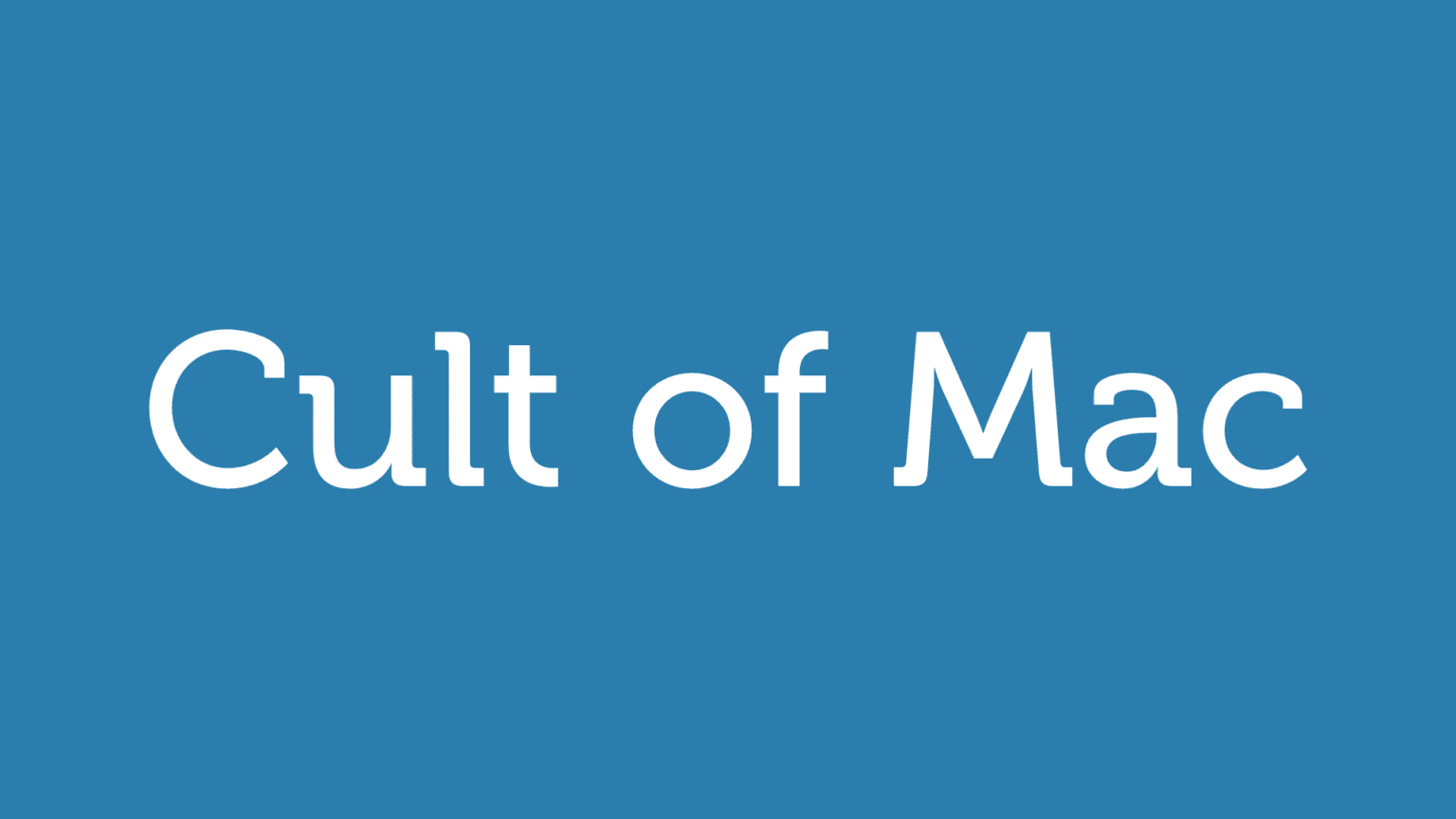

[polldaddy poll=3312803]
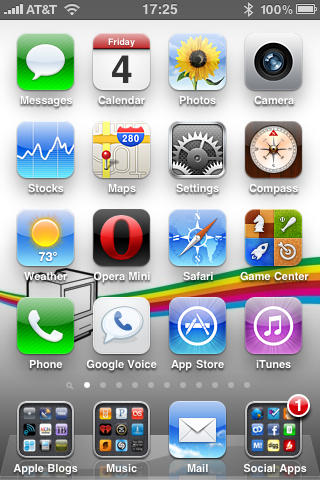
I have been using OS 4 for a couple of months now. It’s amazing how subtle changes can affect the way the whole operating system feels. From the unified inbox to the portrait mode lock, Apple really has taken their time with improving the iPhone experience. I have been using OS 4 on my everyday iPhone 3GS (not recommended) and it’s been quite a bumpy ride (especially when I lost my camera functionality) but using OS 4 everyday has been awesome.
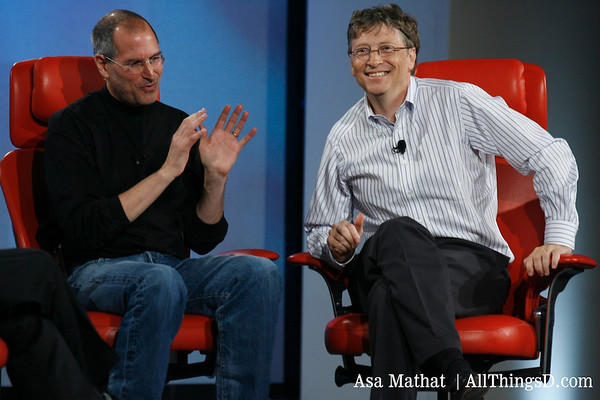
This is a guest commentary by Shawn Ahmed, a anti-poverty campaigner. It was originally published here.
Last week, Apple surpassed Microsoft to become the world’s biggest tech company. As someone who used to spell Microsoft with a dollar sign, I can’t believe what I’m about to say: this is a bad thing for the world.
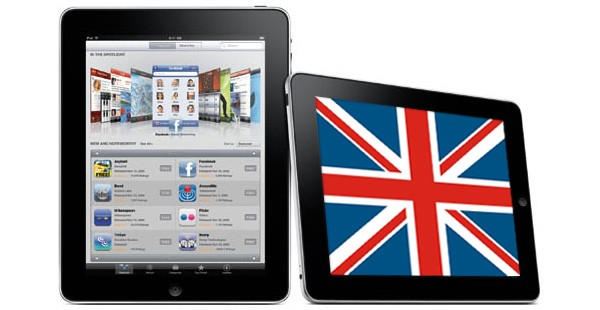
Much has been made over the last 24 hours about the fact that Apple has managed to sell two million iPads in just 60 days — a pace dramatically ahead of the original iPhone, which took 74 days just to get a million units into the hands of the public. Much less-debated, but potentially more interesting for Apple’s long-term future, is that the iPad has grossed more than $1 billion in revenue by hitting the 2 million mark. At $499 a pop and units as pricey as $829, they’ve cleared that barrier by a flying leap in record time. For context about just what a monumental achievement this is, consider the fact that when FedEx reached $1 billion in gross sales in its tenth year of operation, that was the quickest rise to a billion dollars in revenue without acquisitions in the history of American business.
Apple’s growth machine has hit a new gear with iPad, and I’d like to take this post to due some geeky quick and dirty analysis in the manner used at my day job to get a sense of Apple’s expectations for the platform and to guess as to whether its rapid take-off is a good sign or a sign of danger.

The Asian electronics giant Foxconn is in full damage control mode after yet another suicide at one its giant Chinese factories, which cheaply pump out electronics for Apple and others. But one of the company’s representatives made an unfortunate statement when talking about the conditions at its factories:
“There is a fine line between productivity and regimentation and inhumane treatment,” said Louis Woo, an aide to Mr. Gou at Hon Hai. “I hope we treat our workers with dignity and respect.”
But of course, that’s not true at all. There’s a huge difference between productivity and inhumane treatment, not a “fine line.” And it’s that gap that makes all the difference.
Foxconn has a reputation for a stressful and oppressive work atmosphere. Employees are paid relatively well, but are pushed hard to produce and are not allowed to talk to each other during work, according to reports. The work is repetitive, mind-numbing and robotic. Stress, isolation and hopelessness: it’s a recipe for trouble.
Apple and the other tech companies that are Foxconn’s customers must bear some responsibility here. It’s time Apple stepped up its annual audit of contractors and lived up to its promise of “ensuring the highest standards of social responsibility.”
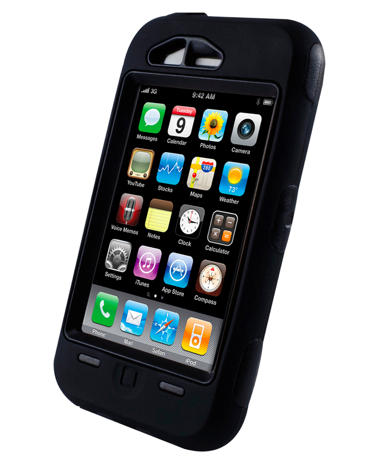
We here at Cult of Mac receive a ton of email asking “What’s the best _____?” or “I just got a new iP___, tell me what sweet apps I should purchase!” Though we try to cover the vast realm of the best of Apple products, software, and accessories we know that crowdsourcing it to you guys will give us some interesting results.
We’re posting questions on our Facebook Page or Twitter profile and taking your answers into consideration. Here’s the first question of our Nerd Debates: “What’s the best iPhone case out there and why?”
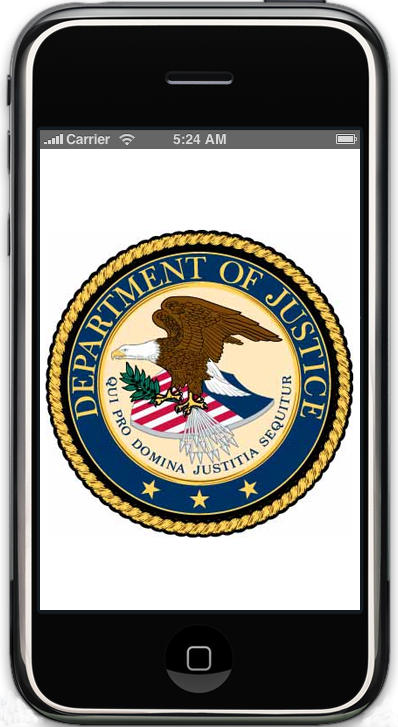
I am all for the Federal government funding and deploying a robust and relentless antitrust division. I don’t wish to go into detail or name examples here and now, but I believe the emasculation of antitrust and restraint of trade investigation and prosecution over the past 30 years has meant a great disservice to the public and to the economy. If that arm of the Justice Department gets revived under Obama it will be a good thing for the country and for the world.
With respect to antitrust claims against Apple related to either the iPhone Developer’s Agreement or the iAds program I don’t think Apple has a thing to worry about.
![Why I Returned My iPad To The Apple Store [Hint: iPhone OS 4.0] cult_logo_featured_image_missing_default1920x1080](https://www.cultofmac.com/wp-content/uploads/2022/04/cult_logo_featured_image_missing_default1920x1080-1536x864.png)
As a contributor to Cult of Mac, you can probably guess that I’m an Apple fanboy. I showed up to the Apple Store at 5:45 AM on April 3rd (iPad Day for you civilians) ready to have my mind blown. Little did I know that I would soon be returning my iPad to that same Apple store.
I blame iPhone OS 4.0 and here’s why:

Jean-Louis Gasseé, gather of the Macintosh II and the BeOS, is a canny thinker and doer in tech. Even though he doesn’t quite have the track record of, say, Steve Jobs (by inches), he does know what he’s talking about, he guided not one but two great PC platforms, and he’s worth listening to when he has something to say about the rising trends.
On his blog today, he writes about “Very Personal Computing,” the arrival of the smartphone as the most profitable sector of the tech industry. As he notes, the PC is finally moving toward a state of less relevance, at least from a business perspective. Despite being No. 1 in PCs, HP realizes around 1/6th of the profit from that business that Apple does from the iPhone. That, as should be noted, is despite the fact that Apple isn’t even one of the top 5 manufacturers of phones on the planet.
This is absolutely essential reading, especially in thinking about the next big wave of mobile innovation. HP’s acquisition of Palm is really one to watch…
Via Daring Fireball
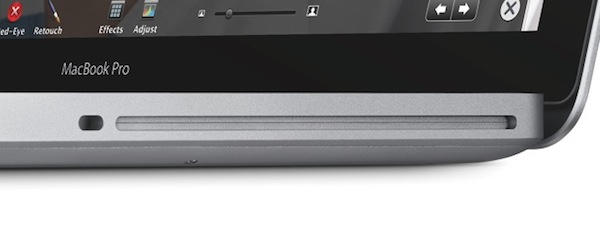
My esteemed colleague John Brownlee wrote earlier today about the excellent article at Ars Technica which explains in detail why the new 13″ MacBook Pro doesn’t have a speedy i5 or i7 chip, while its bigger brothers and sisters do.
What interests me more, though, is the discussion that follows the Ars article.
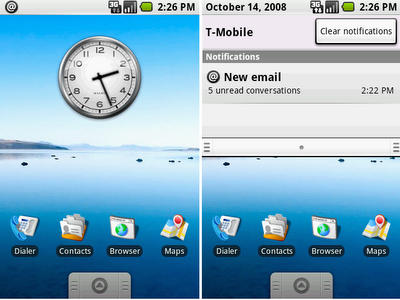
A variety of circumstances, all of them terribly uninteresting, have prevented me from commenting on the recent introduction of iPhone OS 4 hot on the heels of the iPad launch. Since I’ve missed the window, I’ll keep the big picture thinking short: I think Apple has done exactly what it needs to maintain its lead in mobile operating systems. I wish I had it now. I will be annoyed if paid apps get over-run with iAds, but I don’t think such paid apps will sell well enough to survive.
But there’s a lot more to discuss in the details, and here, I have one big quibble with iPhone OS 4 – and it’s also a strength of WebOS and Android. Why haven’t notifications been fixed yet? If you own an iPhone, you know exactly what I mean. As you browse the web, or play a game, or even compose an e-mail, a blue box with white text pops up in the middle of the screen, letting you know about an imminent appointment, an incoming text message, a bill due through Mint.com, or even a Facebook friend request from your high school nemesis.

Note: This is a guest column by David Yoken, founder of Macuity, a Boston Apple consultancy, who discusses the joys of providing IT and repair services to machines that “just work.”
Just got off a call with an architectural firm for whom we set up a brand new server last week. The typical conversation I have with clients is amusingly formulaic, and this one was much of the same:
Me: How’s everything going with your new server?
Customer: It’s really wonderful. We haven’t had any problems, and the transition has been nearly seamless.
Me: Super! I’m glad things are working out. I suppose now would be a good time to talk about a service and maintenance contract and schedule for your new equipment.
Customer: Well, we probably can handle most everything on our own. Apple makes it so easy, so we’ll be fine!
Me: Oh, umm…, absolutely! How about remote monitoring or help desk services?
Customer: Yeah, sure, but you probably won’t hear from us much on that end either. I think we can take it from here, but thanks!
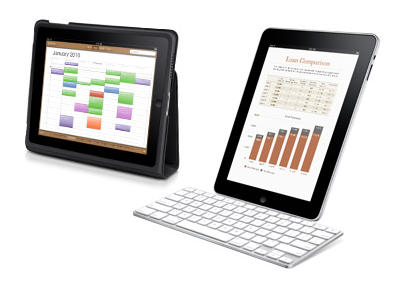
Who knows how the iPad will ultimately be used? Certainly no one at this early date.
Is it merely an ebook reader, or is it a gaming device? Could it be an honest-to-goodness tool for business?
Like so many things, it all depends on your expectations.
It’s well known by now that early impressions of the iPad find it pooh-pooed by the technorati and generally lauded by the great unwashed as a fantastical window (if you’ll excuse the pun) into the future of mobile computing.
The highly regarded founder of Daily Kos, one of the Internet’s most widely read blogs, weighed in Sunday with a wide-ranging, detailed review of Apple’s latest creation and pronounced the iPad a gadget that “scored big as … a device that makes my life easier,” calling it “better than a laptop.”
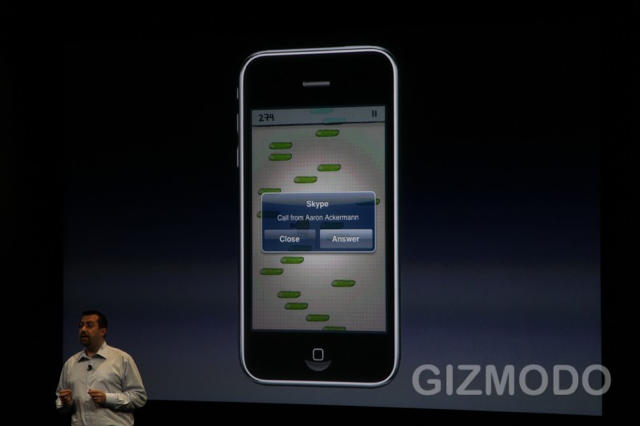
OPINION: The scuttlebutt was pervasive and we all hoped it was coming, so when Steve Jobs announced iPhone OS 4.0 multitasking at today’s event, it was more a pleasant confirmation than a surprise. It may have more than surprised Apple’s mobile partners, though: the addition of background VoIP functionality will, at the very least, finally force wireless carriers like AT&T to compete with companies like Skype on their own networks.

Boy, Steve Jobs doesn’t mess around, does he. Not content with his Google throwdown, he’s challenging the entire telecommunications industry with the iPhone’s new Background VoIP.
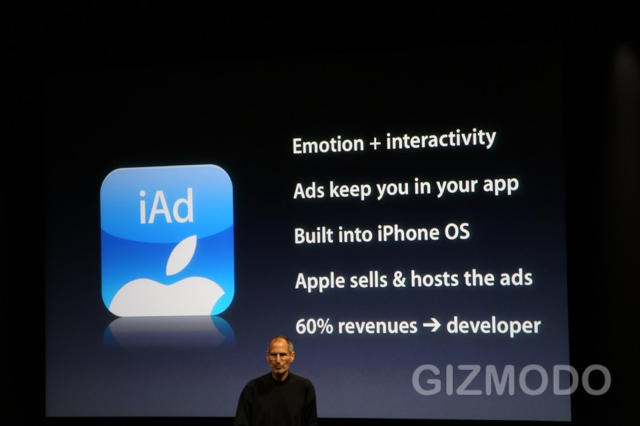
OPINION: Steve Jobs saved the most important part of his iPhone 4.0 announcement today till last — the new in-app advertising system, called iAds.
The iAds system is important because it allows the App Store to create a completely self-sustaining app economy that is sealed off from the wider Web.
Tech guru Tim O’Reilly says the App Store is already becoming a rival to the web itself. The App Store, he says, is “the first real rival to the Web as today’s dominant consumer application platform.” Consumers will have no need to visit the web on their iPhones and iPads if they get everything they need from apps, which is bad news for companies like Google.
“This is a new phenomenon,” Jobs said about apps at today’s presentation. This is the first time this kind of thing has ever existed. We never had that on the desktop, so search was the only way to find a lot of things.”
The App Store economy is already pretty well developed. There is the app purchase mechanism itself through iTunes, and in-app purchases, which allow consumers to buy stuff from inside apps themselves. But there was a big hole: advertising. Ads are already a big part of the app economy, but clicking on them typically takes consumers out of the app and into the browser, an experience Steve Jobs describes as jolting.
But now Apple has built a sophisticated ad-serving mechaninsm right into the iPhone (and iPad, natch), which will make the App ecosystem like AOL in the early days — a walled garden. And one that has it’s own economy: in-app purchases, and now in-app advertising. There will be no need to go to the wider web anymore — and that cuts out Google.
“What’s happening is that people are spending a lot of time in apps,” Jobs said today. “They’re using apps to get to data on the internet, rather than a generalized search.”
No wonder Apple and Google are at war. Google swooped in a bought AdMob just to keep it out of Apple’s hands (so Apple snapped up Quattro instead). Of course, Google isn’t on the ropes yet. Android is Google’s attempt to keep it relevant in mobile, and so far it’s holding its own against the iPhone.
But if early numbers are any indication, the iPad is going to be an iPhone-sized hit. Combine the iPad, iPhone and iPod touch, and that’s a lot of mobile devices in Apple’s walled garden.
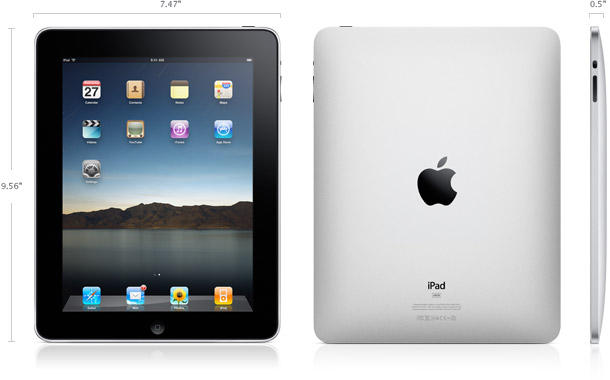
The hottest debate going at the moment is whether or not the iPad is a laptop or netbook replacement. The conversation has focused on the quality of the virtual keyboard, the power of the processor, the storage capacity, and the simplified UI. But we now have a definitive opinion on the topic — Apple’s. Hinted at in the technical specifications now confirmed in Leander’s unboxing, the iPad won’t even turn on unless it has been synced through iTunes.
I sincerely hope this changes. You’re not going to attract an army of non-computer savvy users to a revolutionarily simplified platform if they have to own a regular computer, too. It’s time to cut the umbilical cord, Apple. Let the iPad exist unto itself. If you never connect it to a computer, it should still work brilliantly. If you want to connect it to a computer to transfer files, so be it. But the Mac didn’t need to sync to an Apple II. The first PowerBook didn’t have to dock into a Quadra to turn on. You’ve made a serious new computing platform for the rest of us. Don’t treat it like it’s just an iPhone, dependent on a big brother computer to be truly useful.
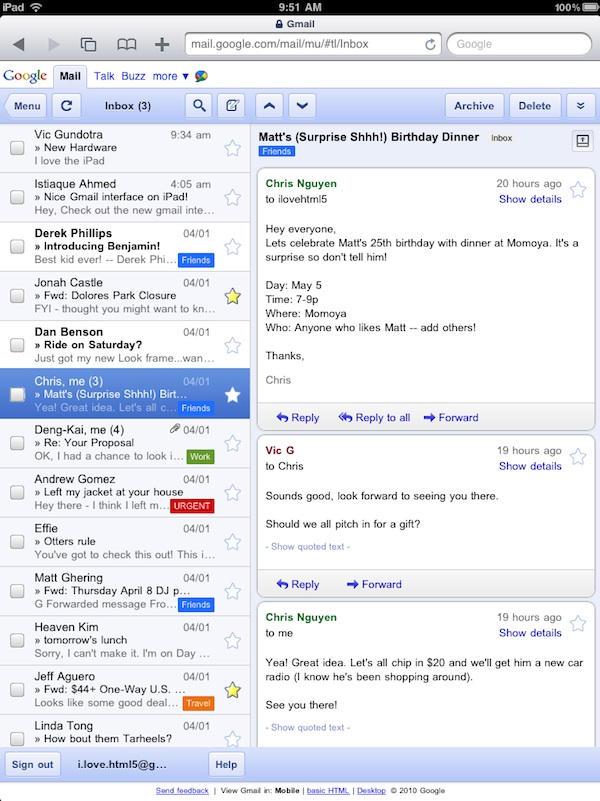
Not wishing to get left behind amid all the iPad fussing, Google has announced an experimental web UI for iPad and other tablet devices.
Taking cues from Apple’s own Mail for iPad, the webapp puts an inbox down the left side and displays messages on the right.
In the same post, Google’s Punit Soni reminds us that no matter how bad the Apple-Google relationship has been painted by the press, things are obviously going well enough for a number of Google products to be included by default on iPads out-of-the-box, namely: Google search inside Safari, YouTube, and Maps.
That doesn’t sound like two companies at war to me.
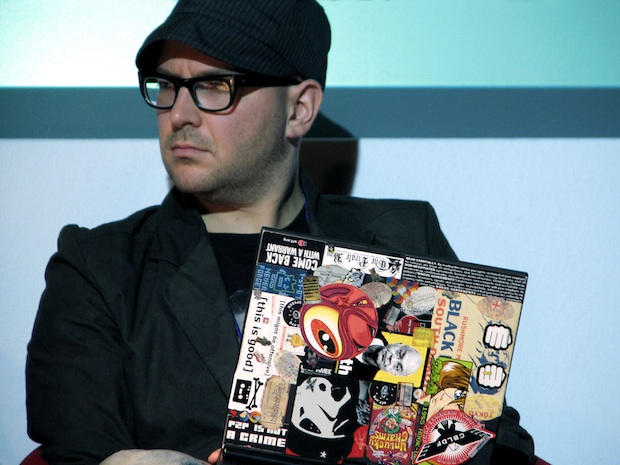
A pair of alpha nerds, BoingBoing’s Cory Doctorow and Lifehacker’s Gina Trapani, have just published strong anti-iPad pieces. Neither is buying the iPad, for different reasons.
Doctorow is firmly against the iPad because it’s too commercial and locked down. He wants an open device he can hack. And Trapani thinks the Mark II iPad will be so much better than the first, only an idiot is will buy the first version:
Cory Doctorow (BoingBoing): Doctorow has a host of reasons he’s not buying the iPad, among them: it’s the second coming of the CD-ROM “revolution,” you can’t share media with others, the device itself is glued closed and it hastens the Wal-Martization of software. “… there’s also a palpable contempt for the owner. I believe — really believe — in the stirring words of the Maker Manifesto: if you can’t open it, you don’t own it.”
Gina Trapani (Lifehacker): Trapani predicts the price will halve in short order, and that next year’s model will be much better. “First-generation Apple products are for suckers. Only lemmings with no self-control and excessive disposable income buy first generation Apple products, especially in a new gadget category.”
CoM’s take: I don’t change the oil in my truck and I don’t want to change the batteries in an iPad. It’s open where it counts: access to the web. And I bought the first iPhone, the first iPod, the first Airport and plenty of first-generation Macs. Haven’t regretted buying any of them (except the first Time Capsule, which just died).
Doctorow has a Sad Mac tattoo, btw.
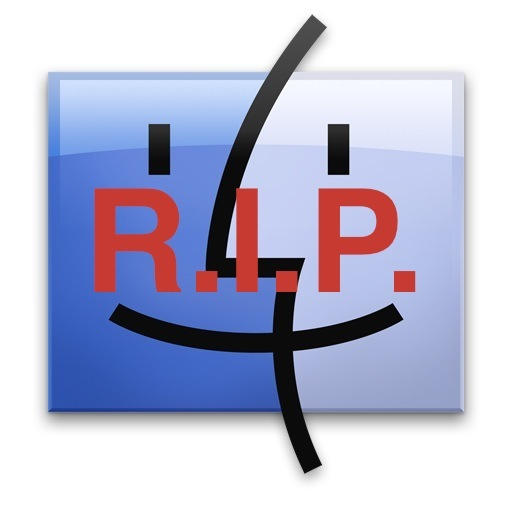
Sachin Agarwal is one of the founders of hip email blogging service Posterous – but he used to work for Apple, and like a lot of us, he has opinions about OS X.
His latest is something that sparks a certain amount of controversy, because he’s predicting the imminent death of the Finder.

The New York Times this morning calls Tony Fadell the “godfather” of the iPod (he’s leaving Apple for greener pastures). But the title should probably go to Jon Rubinstein, the former head of Apple’s Mac and iPod divisions and now CEO of Palm.
The history of the iPod’s development is told here and here, but the short story is:
1. In late 2000, Steve Jobs asked his executive team to look at gadgets people were attaching to the Macs. Perhaps Apple could do a better job of designing them. Videocameras were an obvious candidate, but they were already pretty good. Jobs wasn’t sure Apple could do better. But early MP3 players were a different story — they were horrible.
2. Jon Rubinstein, the head of hardware, hired Tony Fadell to look into making some prototypes, but the project didn’t go into high gear until Toshiba showed Rubinstein a tiny 1.8-inch hard drive it had just developed. They had no idea what to do with it, but Rubinstein did.
3. Rubinstein called Jobs to tell him he’d found the perfect technology for an MP3 player, and he kept Fadell on to oversee the early protoypes. Fadell did such a good job, he went on to become head of the iPod division and eventually took Rubinstein’s job.
As Steven Levy says in his writeup of the iPod’s development, The Perfect Thing:
There is no single “father of the iPod.” Development was a multitrack process, with Fadell, now on staff, in charge of the actual workings of the device, Robbin heading the software and interface team, Jonathan Ive doing the industrial design, Rubenstein overseeing the project, and Jobs himself rubbernecking as only he could.
However, I give credit to Rubinstein, who was at the heart of the development process. He had the initial technological insight, put together the team to develop it, and led the charge to keep improving and updating the device. If there’s a godfather of the iPod, it’s Jon Rubinstein.

Here in the UK, politics is in a strange limbo and will be for the next few weeks. The sitting Labour government has to call a General Election very soon (most bets are on April 6th for Prime Minister Gordon Brown to visit the Queen to ask her permission).
As a result, not much is happening. The political parties are making frantic behind-the-scenes preparations for the election, while the politicians are going through the motions, waiting for the official election announcement to be made.
All of which makes this morning’s speech by Prime Minister Gordon Brown, in which he announced a new official 10 Downing Street iPhone app, all the more surreal.
Brown is not well known for any love of technology (although I think he’s slightly more tech-savvy than his hopelessly Luddite predecessor Tony Blair, who openly admitted his complete ignorance of all things technical). But what annoys me more than anything else is that Brown should waffle on about Britain’s digital future on one hand, while his Government desperately tries to push the disastrously flawed Digital Economy Bill through Parliament with the bare minimum of debate.
That Bill, if passed, will allow household internet connections to be cut off permanently on the say-so of vaguely-defined “copyright holders”. The music and film industries are strongly in favour; pretty much everyone else, including the ISPs, is very strongly against. It’s a case of lobbying overtaking common sense.
If you live in the UK and, like me, you think this rush to push through a bad law is a bad thing, you should do something about it – soon.
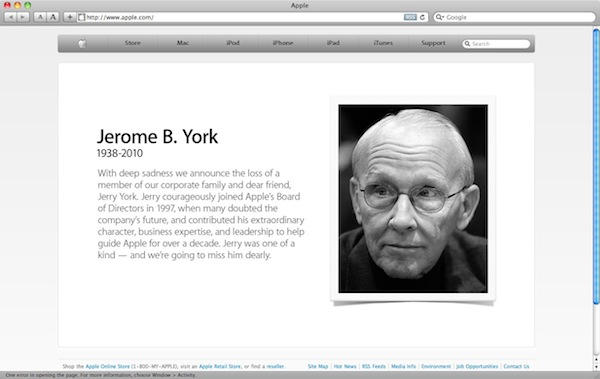
If ever you needed a sign that Apple was a different kind of technology company, this is it.
What other computer manufacturer would remove its top-selling, hype-inducing, industry-altering new product from the prime spot on its website home page, and replace it with an obituary to an investor?
This is one of those “Here’s to the crazy ones” moments, a corporate action that is uniquely personal. This is one of those times when the vast corporate entity that is Apple speaks with a very human, very uncorporate tone.
Jerome York was a huge figure in the auto and technology business sectors. Apple’s tribute to him is a reflection of just how important a role he played in the company’s early history.
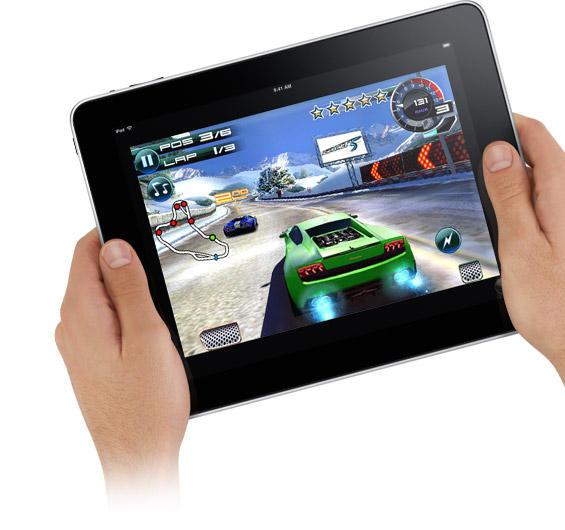
If you’re in the market for an iPad — and you know you are, because it’s killer — you’re probably wondering which model to buy.
Naturally, you’re looking at the cheapest $499 iPad, which has Wi-Fi only, but you’re thinking you might also want 3G. After all, you can pay-as-you-go for data, and who knows when you might need it? And what about storage?
I’ve though it through, and concluded that most people should buy the 32GB iPad with Wi-Fi + 3G, including the wireless keyboard. Here’s why: